I’ve been taken by Adrianna Tan’s recent stream of posts about her experience as a gay woman in Singapore, namely The One About Having It All, Dear Gay Teen, and Dear Fundamentalist Christian, not least because localised narratives are so few and far between. Conservative voices would have us believe that the LGBTQ community is disproportionately loud here, but there were definitely too few stories – especially from those who aren’t cis men – when I needed them (and I still do).
In the middle of a shitty summer break at home renegotiating closets and bigotry after what was a big year for me coming out while physically in London, Adrianna’s words gave me hope. They made me feel like having so much of my immediate future tied to this country might not be a dead-end path after all. At the same time – through no fault of hers, for we are very different people in very different circumstances – they also did little to assuage the fears I have about living here.
As someone who’s yet to so much as graduate, I am in no position to give anyone advice on how to live their lives or what to expect from them. (I hold a special sense of loathing for those who presume to be able to do so on platforms like Thought Catalog, or those not even of this generation who churn out endless trend pieces on ambiguously categorised “millennials.”)
What I can do is talk about what scares me.
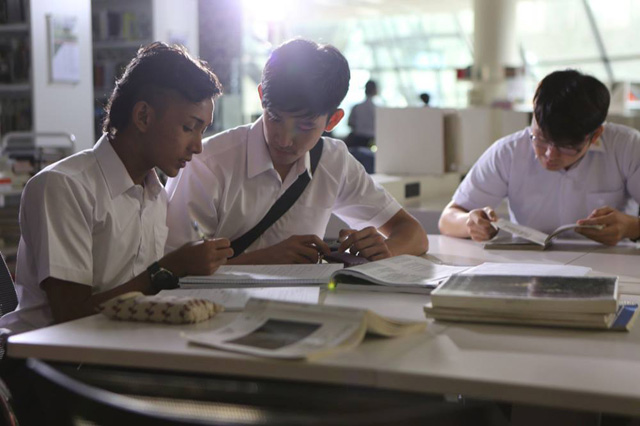
via Pink Dot SG
That I/We Will Live in Isolation
I don’t fear not finding romance or partnership. Whenever I complain about singledom (and I’m horrible at functioning as an unpartnered human being), my partner dryly reminds me that I’m the very definition of serial monogamy, having spent more time in relationships than out of them since age 15. (In return, I point out that there are only so many best friends I can have fall in love – or bed, or both – with me, and I might have to revise my lady-charming techniques should we ever split up.)
My partner is my closest friend and my safe space. She’s kind, endlessly supportive, and when the rest of the world shuts out this angry brown queer, she gets it. I am so, so lucky to have her with me.
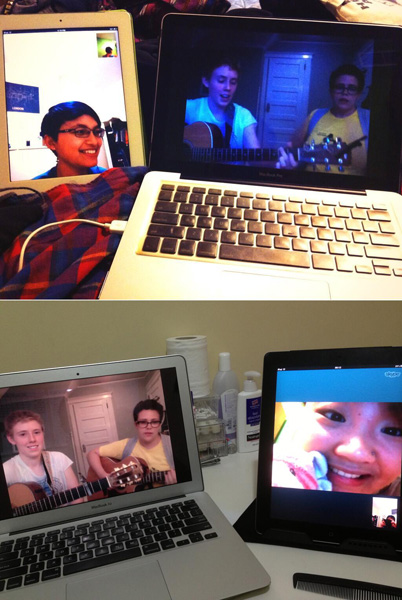
The anatomy of a long-distance, camera-shy relationship (in other words: I don’t have photos of us)
But I need more than that. We both do.
We need friends and we need family. We need community. We need support systems, especially because so many like us see the ones that we were born into or that we grow up with taken away from us. It’s often said that Singapore has a large gay community, but I’m not sure it’s accurate to conflate having a large number of gay people with having actively engaged, connected communities built around queer identities, and this statistical speculation is one that is incongruent with the experiences of my peers and me. Maybe we’re too young, maybe we don’t go to PLAY enough (or ever), or maybe we just haven’t been looking in the right places. We’re not isolated, in general — most of us have healthy social lives and are privileged in our education and careers — but we struggle to find groups in which we don’t feel different.
Community building is impossibly difficult when we’re literally denied spaces to come together, a problem that is endemic in civil society here. It is slowly getting better, and I’m fortunate to be in a place and time to witness this happen. Groups like Sayoni and events like IndigNation allow us to meet and connect with other LGBTQ people in places that don’t (always) involve alcohol, darkness and anonymity.

Pink Dot, a growing annual gathering of LGBTQ people & straight allies
via Pink Dot SG
Yet these spaces can only do so much. While actively repressive techniques — like police entrapment, criminalisation of expression and repeated exclusion from legal avenues of assembly — are too far back to be part of my personal memory, they’re still recent enough to cast a long shadow on today’s activism. Organising as we see it now, operating just under the radar in public view but not always with public permissions, is impressive but stops short of being able to reach out to the ones who need it the most.
During International Autostraddle Brunch Weekend I found myself at a mini-roundtable about coming out with my partner and two people I’d only known as acquaintances before, and I thought, “This. This is what I’ve been missing.” To be at home among people who make you feel at home: it makes a world of difference. This is what so many queer youth need and it’s what so many of them here don’t have.
I’m starting my community small now, with the people I know, the people they know, and the occasional person off the internet. (If you’re reading this and feel the same way, please do not hesitate to get in touch.) It’s hard, but it’s not impossible, and we need – no, deserve – to be so much more than alone.
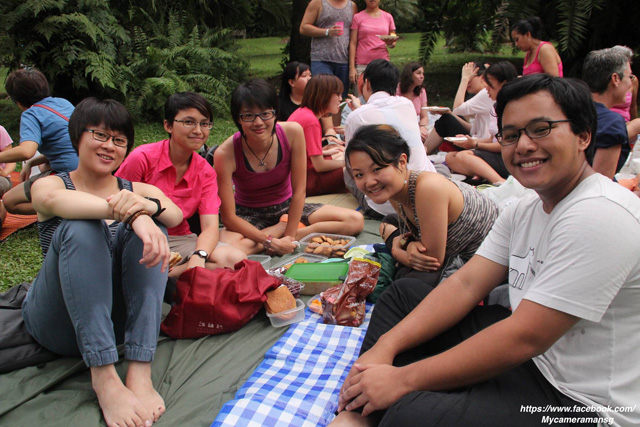
via Love Singing
That I Will Never See the Family I Want
These things I take as given: I will not get married, adopt a child, or own a house in the foreseeable future. Not all of these are completely impossible, but each requires overcoming formidable financial, legal and policy barriers to reach the level of status quo the majority of the population take for granted.
Yet while these are rights I will fight for politically, they are not what I want personally. I have no interest in a 2 parent + 2.1 children family to fit into a 3-room HDB flat. This is not what family looks like to me.
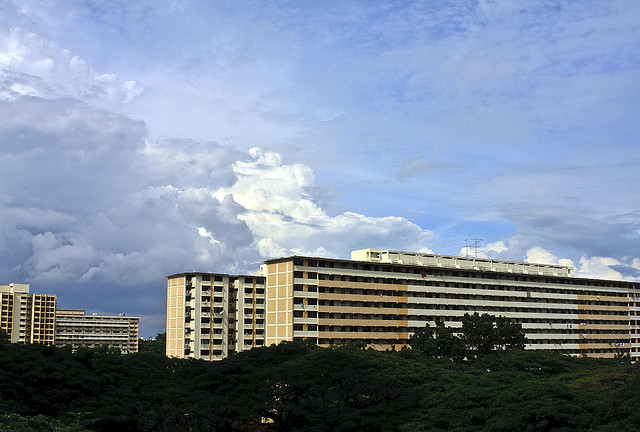
Government-built HDB flats, in which 80% of Singaporean residents live
via Greh Fox / Flickr
From both a queer and cultural perspective, the dominance of the two-parent nuclear family model (often with an underpaid domestic helper appended) is unnatural to me. Janis, in Alison Bechdel’s Dykes to Watch Out For, is raised by her single mum Jasmine, has a “gender-blending role model” in Lois, is homeschooled by Stuart, and is Jiao Raizel’s de facto older sister. She’s cared for by a close-knit community for whom blood ties are only incidental. As a child, I was provided for by my parents, nannied by an unrelated neighbour and her family, lived with my grandmother and aunt, and celebrated birthdays, exam results and all manner of small events with an extended family of more than 40 people.
The queer family isn’t bound by biology or social norms. It can choose to be – there is nothing wrong with that – but it is not there by default. My queer family is multi-generational and multi-dimensional; it is messy and loosely-defined; and it’s built on love, sometimes loathing, and always commitment.
This queer family doesn’t exist in a vacuum. It requires legal and societal permissions to exist, especially in a small (and intrusive) country as this.
It’s fair to say this arrangement is technically possible in Singapore – if you’re wealthy. If you can afford to live in a space bigger than HDB’s cubicles (which are themselves impossibly expensive). If you can collectively afford to sustain yourself, your partner/s and your dependents without the numerous and substantial government financial grants thrown at the feet of married heterosexual couples. If you can afford to run the risk that should something go wrong – say someone falls ill, a relationship falls apart in a bad way, or a biological-but-uninvolved relative decides to stake a claim in your family – you can find the individual means and legal avenues to protect the ones you love. Few of us can hope for this.
Partly in jest, my partner and I often say we want to live on a queer commune in the future. Some of this is literal: the idea of a self-sustaining group household appeals to us on so many levels. More fundamentally, though, this queer commune is a metaphorical expression of the desire for a family life that is richer and more diverse than what the state-sanctioned heteronormative model affords us, one that is bound by affection and responsibility rather than designated roles. We want to live in a society that respects and values that, or at the very least does not actively seek to extinguish it. This is not that society.
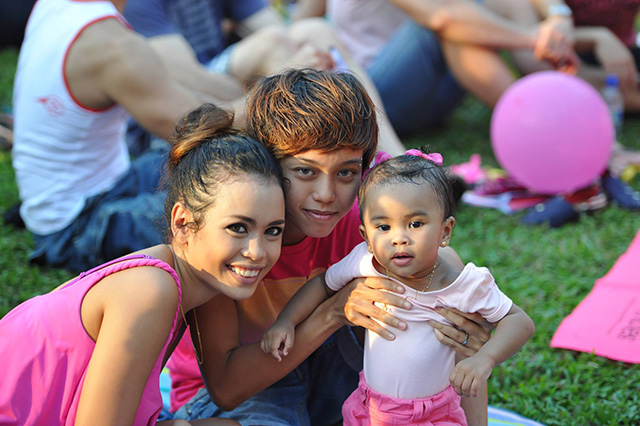
via Pink Dot SG
That I Will Lose Culture and Community
To say that I have a complicated, confusing relationship with race, ethnicity, religion, language and culture – yes, all of them – would be a gross understatement. Under this nation’s terribly progressive approach to racial classification, I am Other, and as a child when asked “what” I was I would say, “Nothing.” When asked what my cultural background, I would say, “I have none,” and I would think, “Not yours.” They say you don’t recognise culture till you’re out of it, like a fish out of water, and for the longest time I felt like an amphibious being still looking for the pond it came from.
This is how I still feel in queer communities, especially activist ones. A lot of my queer/feminist engagement began in London, where, unsurprisingly, physical and metaphorical spaces are dominated by white people and whiteness. I don’t identify with the Singaporean community there, which is predominantly Chinese and affluent. I don’t identify with the Muslim community there, either, which is more South Asian and Middle Eastern than Southeast Asian. Yet it’s also in London’s messy heterogeneity that I found individuals whose experiences at the intersections of race, religion and sexuality most closely mirrored mine, and it is in London where I learnt to start talking about race at all.
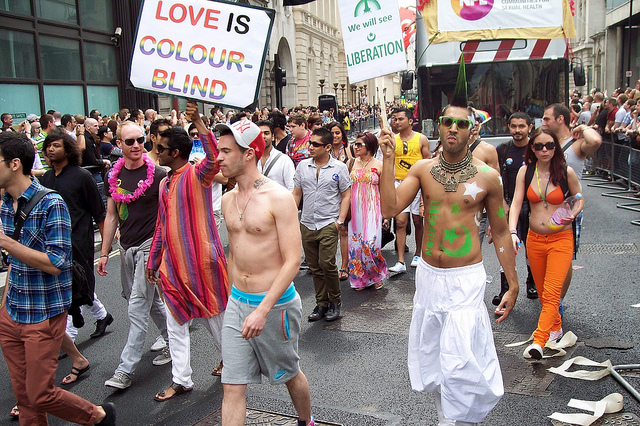
London Pride 2011
via Richard Tanswell / Flickr
At the crossroads of brownness and queerness my anxieties are twofold. The political: will I always be fighting to make room for my selves, occupying spaces in which no one else looks like me?
I have no interest in glorifying my cultural background in simple opposition to others’. I consider religious classes to be among my most unhappy memories: taught in a language I was haltingly fluent in, teaching me not to question and scaring my younger self into self-doubt and submission. The Malay Muslim community in Singapore – using “Malay” in the loosest, most inclusive sense of the label here – is culturally and politically hostile to queer people (which should not be taken as an indictment against individual Malay Muslim people, among whom I have always been and from whom I still find friendship and support). There have been so, so many times I’ve wished I could turn my back on all this.
Yet I’m similarly antagonised by the prospect of participating in queer spaces and communities which are ignorant of, if not outright hostile towards, the ways in which my racial and religious identities shape the way I perceive and experience queerness. Racism and Islamophobia are just as endemic in LGBTQ spaces as they are elsewhere, and talked about even less. Constantly being (forced to be) the killjoy – especially in the few spaces you dare to expect acceptance – is tiring, demoralising, and eventually silencing.
But I who am bound by my mirror
as well as my bed
see causes in color
as well as sexand sit here wondering
which me will survive
all these liberations.– “Who Said It Was Simple”, From a Land Where Other People Live, Audre Lorde
Then the personal: I fear that embracing my sexuality and the life that comes with it comes at the expense of the life I come from. My queerness violates the cultural guidelines I grew up with, and my brownness is absent in popular queer narratives. What does it look like when a brown queer woman gets married? What does it sound like when she names a child, and what languages does she speak to them in? What does it look like if she doesn’t do any of these things – what is it, then, that still makes her a brown queer woman?
My religious and cultural identities are fluid, as much a function of the environments I’m in as they are a mark of my birth and upbringing. I call my relatives auntie, uncle, wak, nyai, yai, datuk, nenek, ammi, ammahti, baba. I eat rice with my hands. During Hari Raya I femme it up for my mother’s sake and light sparklers with my siblings, and if they ask nicely I slave in the kitchen for hours making kuih that I know they’ll eat most of before any guests come to visit. I do all this not because of an abstract commitment to race or religion, but because these practices are family and these practices are me.
I’ve never been fluent in bahasa pasar and I’ve always tried to get out of attending void deck weddings (the food’s never vegetarian), but these still feel much more real to me than pictures of Ellen and Portia’s wedding or even the story of anti-377A poster couple Gary and Kenneth. I cannot get a firm grasp of – much less put a label on – my “culture” most days, but I do know that taking it away will mean taking part of me away.
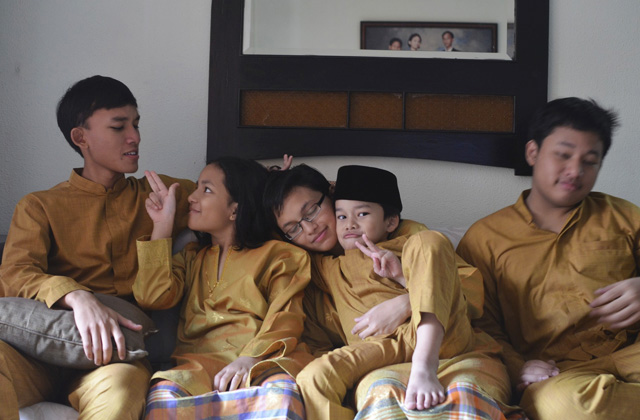
That Someone I Love Will Die
When I was in an unhealthy relationship, the kindest thing the adults in my life thought to do was close an eye to it. To turn away and let me be because I was in a relationship with another girl – something that was known to happen but not talked about – and in so doing they didn’t notice that I was turning up to school exhausted, that my grades were nosediving, and that I was growing distant from friends I’d known for years.
Same-sex partner violence happens. Too many stories in I Will Survive and elsewhere give evidence to this. It happens because some people are just assholes, yes, but it also happens because exploring sexuality and relationships in an environment with little to no education of consent and boundaries, overwhelming religious and societal pressures, and the prevailing mindset that same-sex relationships (especially teen ones) aren’t real and don’t “count” is a toxic, explosive mixture.
Who do you turn to, then, when the worst happens? Who can you trust to condemn your abuser’s behaviour, and not pathologise your gender identity or sexuality instead? Who’s going to tell you that it’s not okay for you to be treated this way, not that it’s not okay for you to be this way?
I am afraid help will come too late to someone in my life. I am afraid that closets become coffins.
I now count myself lucky in that I learnt early on what I will and will not accept from other people. I am fortunate, too, in that I hardly struggled with accepting my sexuality and was thick-skinned enough to weather the insensitive, stupid remarks from schoolmates that arose as a result of it, but I know this is far from a common experience: anthologies of queer stories often also feature account after account of people hurt by those they trusted, victimised by strangers, and wanting to end their own lives.
The closet is a bitter, destructive place, and its shadow lingers even when you try to leave. (If you can.) I’m still learning how negotiating disclosure, comfort and safety works as an adult, but I’ve already seen what always being on the margins of what is acceptable can do to a person.
That I Will Give Up
I know as I write this that there will be people who’ll question everything I say, whether it’s the queers who’ve Made It and feel that everyone else should be able to, or the straight “allies” who tell us to be thankful for what we already have here because it’s so much worse in [brown people country], isn’t it? Be grateful. Be discrete. Don’t go anyhow make trouble, say the wrong thing. It takes so much just to be heard here – here, where we are Tolerant and we are Harmonious, where we cling to our monolithic narratives of Meritocracy and Progress like liferafts – that there is little left to be said for actually getting things done.
Hear me on this: surviving on the margins takes all but everything out of you. Having to continually justify your existence and experiences is exhausting. Scraping together new communities while still knee-deep in the ashes of the bridges you’ve had to burn is hard work. Losing people doesn’t get any easier.
Every day is a struggle up a path strewn with shards of microaggression and blocked by walls of homophobic policies and institutions. I wonder how much the metaphor of the “uphill battle” works here – does it really get downhill from any point, does it get easier then, and am I now closer to the summit or to the ground? Is this a climb worth taking? What does it mean to reach the other side?
I could be so comfortable here. I could turn around, keep my head down and live with what I have going for me now. I know I am personally far more than adequately privileged to be able to do this. I could sit down and shut up, let the everyday queerphobia wash over my calloused skin and pretend I do not see. Pretend I do not see the teen who still reacts viscerally to the word “lesbian” because of how it was used against her, or the single child who must remain in the closet while juggling expectations of career and family, or the trans man who is told by his mother that his identity exists only to hurt her. It would be so much easier.
I’d like to stop being angry, you see. I’d like to stop having to fight for my space and my voice. I’d like to stop because there is no longer reason to be angry, because these are things we no longer have to fight for, and not because I no longer have it in me to be angry. Yet today I hold scarce hope for the world of the former – so I fear being always angry, but I fear the day I stop being angry so much more.
Last month I attended a roundtable hosted by the Association of Women for Action and Research (AWARE) discussing discriminatory public housing policies. (Tl;dr if you’re not married, preferably with children, and/or above 35, you’re never going to own a house.) Someone in the audience stressed that it was an issue of a lack of flats rather than ideological bias, to which I replied that regardless of the availability of housing, it’s still discrimination to privilege a single type of family unit in access to that housing. He countered, “If there were a housing shortage and if I had to choose, of course I’d choose the heterosexual family.”
Therein lies the problem: he does get to choose.
People like him – straight, married, affluent, Chinese, English-educated – get to choose. People like him get to decide what is “good for society”; people like him get to decide what (and who) “society” is, period.
Homosexuals work in all sectors, all over the economy, in the public sector and in the civil service as well. They are free to lead their lives, free to pursue their social activities. But there are restraints and we do not approve of them actively promoting their lifestyles to others, or setting the tone for mainstream society. They live their lives. That is their personal life, it is their space. But the tone of the overall society, I think remains conventional, it remains straight, and we want it to remain so.
– PM Lee Hsien Loong, Parliamentary Speech on 377A, November 2007
You can tell us that you’ll let us be, that you won’t do anything to us, but the fact remains that you could if you wanted to (and you do, often). I am not interested in living on borrowed graces. I will not be swept under the carpet, and I do not want to be merely “allowed” to carry on with my “lifestyle.” I will not be tolerated.
I am an optimistic person – annoyingly so, says my partner – and I am thankful for my life. I am lucky. I rarely, if ever, regret things, and I am excellent at living in one impulsive moment after another.
But living so much in the present is as much a defense mechanism as it is a character trait. I move on from the past so quickly because what’s on hand right now requires all of me, and I do not look to the future because I do not see it. I hit a massive block when asked to imagine what my life will be like in 5, 10 years – and I am happier when I simply don’t think about it.
This country does not plan for a future with people like me in it. This country does not have a future for people like me. It will permit me to exist, it will have me learn how to cope, but it will not allow me to live.



this made me cry. it’s so rare to find anything i can relate to on this level – not just the larger level intersectional concerns, but also kuih! bahasa pasar! the epic weddings! good god.
this made me cry. thank you thank you thank you for existing, for writing, for being here.
Tiara, there is no way for me to say this without sounding stalkerly but I’ve long looked up to you for you being who you are and having done all that you’ve done and being such a vocal, confident person, especially when I discovered how much we have in common re: where we come from. So thank you, too. :)
this was so interesting and completely captured me. thanks for writing it, x
Fikri, thank you so much for this piece. It makes me really happy that there’s a space for this kind of dialogue on Autostraddle. I love how careful, deliberate, and nuanced your writing is, I can’t wait to read more from you.
I teared up at this portion: “My queerness violates the cultural guidelines I grew up with, and my brownness is absent in popular queer narratives. What does it look like when a brown queer woman gets married? What does it sound like when she names a child, and what languages does she speak to them in? What does it look like if she doesn’t do any of these things – what is it, then, that still makes her a brown queer woman?” Because it’s SO true. I find myself looking at Hindu lesbian wedding ceremonies when I think of getting married because I haven’t been able to find any Persian lesbian weddings & projection is literally the only way I know how to cope.
You articulated the liminal space that some brown queers occupy. Yes, we’re tolerated within our families, safe from violence that targets less privileged members in other countries but our experiences are different than the mainstream narratives we find. We still have to navigate the lack of representation and what family means to us and what kinds of futures we want to build for ourselves, and just aaagh, you wrote it all so perfectly.
I’m probably not articulating my thoughts very clearly; this has made my thoughts spin around. Fikri, just know that I love that you’re here. Thank you so much.
I remember seeing the post-DOMA Indian lesbian wedding photos that were circulated a while back and my first thought being wow, that must have cost a lot of money. They were beautiful, of course, but there are just so many barriers, y’know? The legal/political are just the beginning.
The bit about race/religion was the hardest and took the longest for me to write exactly probably because I’ve seen so little like it (and am encouraged to think as little of it as possible, from all sides) so I am so, so very glad that it resonated with you and others.
holy shit, i think the level of excitement i just felt at finding ANOTHER QUEER PERSIAN is probably telling.
Amazing piece. So accurate and merciless. This will stay in my head – and body – for a long time.
Now I can’t stop crying. This is an personal, accurate, gut wrenching piece that really speaks to me. Thank you so much for sharing your story.
“I could be so comfortable here. I could turn around, keep my head down and live with what I have going for me now. I know I am personally far more than adequately privileged to be able to do this. I could sit down and shut up, let the everyday queerphobia wash over my calloused skin and pretend I do not see. Pretend I do not see the teen who still reacts viscerally to the word “lesbian” because of how it was used against her, or the single child who must remain in the closet while juggling expectations of career and family, or the trans man who is told by his mother that his identity exists only to hurt her. It would be so much easier.”
as a white queer girl in singapore this resonated strongly with me. while our experiences of queerness here are obviously so different, i think we definitely share a lot of pain. i’ve lived here since i was not even able to make memories and i would love to spend the rest of my life here because it will always be home. but it’s just not possible to live… genuinely, or just the life i want / need here, and it’s pretty devastating, fracturing, fucked up, whatever word fits. thanks for writing this, i didn’t really know what to do with all of the “gay lifestyle” anger i had (nor do i know what to do with… all the anger, all the time) but this helped. a lot. thank you again – you are great.
“i’ve lived here since i was not even able to make memories and i would love to spend the rest of my life here because it will always be home. but it’s just not possible to live… genuinely, or just the life i want / need here, and it’s pretty devastating, fracturing, fucked up, whatever word fits.”
This is how I feel too. It isn’t even a longing for somewhere else I’d want to (and could) be, it’s just a sense of “not here.”
This was amazing. Thank you for sharing this.
So strong, so smart. Thank you, Fikri, for this incredible piece. I think a lot of folks who believe themselves to be liberals fail to recognize that tolerance is insufficient. I know you don’t need me to tell you this, but being ‘allowed’ to be some edited version of yourself is just not enough. People who don’t have to fight for that (and I include myself here) need to recognize that there is so, so much more work to do.
Just wanted to say that I really enjoyed this
i want to comment on this, but mostly i’m just sitting here, 15 minutes later, still having all the feelings and not really knowing how to articulate anything but to say thanks.
This was beautiful. I’m so glad you’re a regular writer here – we need to hear your stories.
As a 17 year old in Singapore, this piece hits home uncomfortably hard. I’ll probably leave a wall of text here at some point, but for now, thank you for writing this. Just…thank you.
Oh, Fikri… Thank you so dearly for this, for baring your heart here for us all.
I’m hoping the tears you gave me won’t hurt my keyboard. Outside my door is a hostile, conservative, small USAmerican town that shot quite a few arrows into me lately, micro and not-so-micro. But I said nothing. My hide can take it. Oh, yes, we are “harmonious”…
I, too, have no energy for the future. Perhaps this dynamic, of many Queer people living footfall to footfall, explains much about your paradox of having Queer people be there, but no community. Living in repressive societies inculcates a fear of other Queer folk in a way. Many of us fear losing “good enough” to an unreachable “might be.” We fear the soul may starve the belly. People with wealth or nothing can form communities more easily than those who are given (GIVEN!) “just enough” and held in treacherous suspense of it. We must “behave” and be “thankful”.
But what a craven, poisonous, bad faith that so-called gratitude really is. Let us call it by proper names, reject, and scorn it!
I hope your optimism refines in you toward a deep and rich courage that shatters your fears. There is a truth in all Queer lives that dare to be lived: we defy augury, we confound circumstance. Cleave close to love and feed it hot, hot to forge the metal we all need.
May you ever be held in the Light, dear Fikri.
So powerful, so honest. This is brilliant, Fikri.
This touched me especially: “I’d like to stop having to fight for my space and my voice. I’d like to stop because there is no longer reason to be angry, because these are things we no longer have to fight for, and not because I no longer have it in me to be angry. Yet today I hold scarce hope for the world of the former – so I fear being always angry, but I fear the day I stop being angry so much more.”
I relate to this sentiment so much and seeing this fight through the context of your experience makes it mean so much more.
Thank you.
Thank you so much for this. I’ve been enjoying your pieces on Singapore and the region, but this one just broke my fucking heart. I can’t imagine my future in this country either. Also, thank you for writing about the intersectionality of queer experiences. That’s something that doesn’t get discussed enough in Singapore at all.
Great piece. Thank you!
Wow, this was a really personal, insightful piece.
wait. you mean you’re only half serious about the commune?! we need to talk.
Let’s just remember that I love you, okay?
i’m glad we got to watch the hannah and maggie concert together, remotely while in separate parts of the world.
i hope you never stop being angry and i hope that anger cools not in the way that so much anger at injustice cools, in a hardening, deadening way, but in a fierce and cutting way that gives you openness to critique and motivation to work. Blanche described this piece as ‘merciless’ and there’s something right about that. sometimes we need different approaches but here, in your writing, it was so valuable.
i cried the first time i read this and now i can’t read it in too much detail. you know, there will always be more detail: more selves that escape representation, more feelings about the government or housing or kuih. maybe it feels like you’ve told almost the whole story and have tried to get downa all the feelings, but there will be more because you live beautifully, and you take new things or new chances and make more things out of them. this is just one of the perks of your annoying optimism. it’s also why you expect so much of others – rightly so, in the end – and why you manage to keep your anger, and do stuff with it.
ps, we don’t need to split up for there to have reason to go over and spruce up your lady-charming techniques. there are always cool poets to charm you know.
This is beautiful, thank you so much for sharing.
Very powerful, thank you for sharing.
This kinda concrete-ises and puts in words intersectionality queerness and privilege in SG for me. Excuse me while I sit in silence and think about all the ways in which your article is awesome and how one’s feelings are actually never one’s own but is instead shared, unknowingly.
(It was a bad idea to read this in the middle of doing math.)
Thanks so much for this article. I’ve always felt that I love Singapore but it doesn’t love me. As a Singaporean queer currently living in a considerably more liberal country, I see little hope in returning to SG with the kind of attitudes on the ground, institutionalised homophobia evident in plainly discriminating policies and the reluctance/apathy of the leaders of this country to make it right. It’s a shame it has to be this way.
“It will permit to exist, it will have me learn how to cope, but it will not allow me to live.”
Too right.
Thanks so much for sharing this.
This was inspiring! :-) Thanks!
That was a much needed perspective on here! Thank you so much for telling your story and your desire for more than what exists currently in Singapore (and beyond).
I was in Singapore last a few months ago and made a zine on the queer scene if you’re interested…you can find it at: queerscribe.com
Also, while it’s included in the zine, are you in touch with Tania de Rozario and her crew with Etiquette? http://etiquette.sg/
They’re an amazing group of queer and feminist folks who I found incredible solidarity with.
Thanks again for writing this!
Wow,Thanks so much for this article. perfect writing and amazing photograph i like your all post this was a really personal.
They are an amazing group of queer and feminist folks who I found incredible solidarity with.